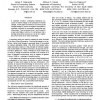Free Online Productivity Tools
i2Speak
i2Symbol
i2OCR
iTex2Img
iWeb2Print
iWeb2Shot
i2Type
iPdf2Split
iPdf2Merge
i2Bopomofo
i2Arabic
i2Style
i2Image
i2PDF
iLatex2Rtf
Sci2ools
141
click to vote
AAAI
2004
2004
Conservative Belief Revision
A standard intuition underlying traditional accounts of belief change is the principle of minimal change. In this paper we introduce a novel account of belief change in which the agent's belief state is modified minimally to incorporate exactly the new information. Thus a revision by p V q will result in a new belief state in which p V q is believed, but a stronger proposition (such as p A q) is not, regardless of the initial form of the belief state. A reasoning entity will need to maintain its stock of beliefs in the face of new information. Such belief change is not arbitrary; rather belief change is generally taken to be guided by various rationality criteria. One of the most widely advocated rationality criterion is the principle of minimal change: that a belief state is modified minimally to incorporate new information [Makinson, 1993]. Perhaps the most evident way in which a change in belief can be said to be minimal is in terms of standard constructions such as systems of...
Related Content
| Added | 30 Oct 2010 |
| Updated | 30 Oct 2010 |
| Type | Conference |
| Year | 2004 |
| Where | AAAI |
| Authors | James P. Delgrande, Abhaya C. Nayak, Maurice Pagnucco |
Comments (0)

